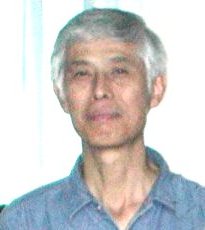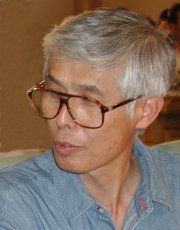
|
|
This NGO's Mr. Kato
Refutes China's Claims
November 11, 2002


Hiroshi Kato, one of the founding members of LFNKR. |
Mr. Hiroshi Kato of this NGO was arrested recently in
China and questioned about helping North Korean refugees. He
was interrogated for 7 days before being released and
returned to Japan.
Shortly after his release, the Chinese government issued a
public statement on the matter, which contained some
surprising accusations.
Below is Mr. Kato's response to those accusations.
For your reference, we also include China's original
statement.
Hiroshi Kato's Response to China
-- October 10, 2002
I, Hiroshi Kato, refute China's allegations at the Foreign
Ministry press conference of November 7.
It is a fact that, since June 2000, I organized the efforts
of 12 North Korean citizens, members of three families, to
flee to Japan or the Republic of Korea through a third
country where they were approved for refugee status.
It was obvious that if these refugees were arrested in China
and repatriated to North Korea, their lives would be in
immediate danger. Therefore, those refugees were fully
eligible for refugee status as is stipulated in the UN
Convention relating to refugee status.
Although China has ratified the Convention, it fails to
abide by the guidelines set forth and continues its
merciless attitude towards refugees by cracking down on
them. It is clearly agreed in the international community
that international laws take precedence over national laws.
However, the Chinese government still does not abide by this
international agreement.
China deliberately gave the impression that I cooperated
closely with some criminal organizations such as the
Snakehead by stating "Collaboration with felon groups."
This, however, is contrary to the truth. Our guides who
helped the defectors cross the border joined the rescue
activities simply because they sympathized with the
refugees' tragic fate as fellow Korean people. As a result,
they brought new lives and hope to the refugees.
Though China claims that the purpose of entry to China via
Dalian in October 29th was "again in an attempt to organize
more trespasses into foreign embassies or consulates," it is
groundless. China's Security Bureau insists, "Kato has
confessed to all the criminal indictments " but I
steadfastly denied all their criminal indictments throughout
the interrogations, and the Security Bureau has no evidence.
It is a fact that, when the 25 North Korean refugees ran
into the Spanish embassy in Beijing, I, Hiroshi Kato, did
give instructions to send out the asylum statement written
by the 25 refugees to the mass media in Japan and around the
world. China cannot, however, conclude from this single fact
that all the instances in which refugees rushed into foreign
compounds that followed this Beijing incident were also
planned or carried out by me. If the Chinese government
persists in its allegation, it is China's responsibility to
prove their allegation is correct.
Though China accused me of "helping illegal entry," those 12
people of three families deserve full refugee status and
protection. Only China asserts their illegality by its own
criteria; and the Chinese criteria in this case deviate from
international criteria. It is China's duty to abide by the
international agreement. The point is that I helped those 12
people flee to a third country because their lives would be
in danger if they were ever repatriated. It was an ethical
cause that cannot be criticized.
"Kato, upon his return to Japan, denied all the crimes he
had committed in China, claimed to have been maltreated
during the interrogations, and accused China of failing to
notify the Japanese embassy in China of his case ... Kato's
accusations against the Chinese side are totally
groundless," the spokesman charged. However, I never denied
the possibility that I violated a Chinese law.
Also, during my interrogation from October 30th through
November 5th, I was forced to sit, for six of those days, on
a 40cm (15.7inch) square wooden chair with a fixed wooden
bar close to my lap preventing me from standing or moving
about. I was interrogated through the morning, afternoon,
night and until next morning at 2 or 3 o'clock. One time,
their interrogation continued until 4:30 the next morning.
Is this not torture? Even when you are sleeping, your right
hand is cuffed to the chair leg, and you have to sleep while
sitting up straight or leaning straight back. Most places in
the international community, this is called torture.
On October 30th, when the Security Bureau declared my
detention, I requested that the interrogators inform the
Japanese consulate in Shenyang of my detention. The
interrogators replied through an interpreter, "That will be
properly processed according to Chinese law."
On November 2nd, when one of the afternoon interrogations
was over, I again requested that they contact the Japanese
consulate in Shenyang or the Japanese embassy in Beijing.
But as before, the interrogators answered through an
interpreter, "That will be properly processed according to
Chinese law."
Furthermore, on November 4th, I made a request for the third
time: "I was scheduled to return to Japan on November 1st,
and my family must be worried. I would like to ask to make a
phone call to my family or to Life Funds for North Korean
Refugees, the organization I belong to. Otherwise, please
inform the Japanese consulate or embassy in Beijing."
This time, I added the two new alternatives to my request.
Thus, China claims, in contradiction to the true facts, that
I did not request such notification.
If China insists that it notified the Japanese embassy
immediately, does China intend to suggest that the Japanese
embassy neglected its duty to protect its national? I invite
China's explicit comment on this matter.
Submitted by
Hiroshi Kato
Secretary General
Life Funds for North Korean Refugees
China's Statement:
Kato's Criminal Activities 'Irrefutable', FM Spokesman
Foreign Ministry spokesman Kong Quan said Thursday the
criminal activities of Hiroshi Kato, a Japanese man who
organized the illegal entry of DPRK citizens into China and
foreign embassies, are "irrefutable" and his allegations of
being "maltreated" in China are "groundless".
On Oct. 30, Chinese judiciary authorities detained Kato as
the mastermind behind citizens of the Democratic People's
Republic of Korea (DPRK) illegally entering China and
trespassing into foreign embassies in the country, Kong
said.
Since June 2000, Kato has, working in collaboration with
felon groups, organized 12 DPRK citizens to illegally enter
Japan or the Republic of Korea via China, and plotted the
intrusion of these illegal immigrants into the Spanish
embassy in China on March 14.
"Kato has confessed all the criminal indictments, saying
that he was in China again in an attempt to organize more
trespasses into foreign embassies or consulates," Kong said.
Kato's activities, the spokesman noted, had seriously
disturbed China's entry and exit administrative order and
public social security, jeopardized the safety of foreign
embassies and consulates and thus violated clauses 318 and
290 of China's Criminal Law.
With the irrefutable evidence against him, Kato should have
been severely punished, Kong said, noting that in view of
his relatively good attitude in the confession of his crimes
during interrogation, China dealt with him leniently and
merely ordered him to leave the country before a set date.
However, Kato, upon his return to Japan, denied all the
crimes he had committed in China, claimed to have been
maltreated during the interrogations, and accused China of
failing to notify the Japanese embassy in China of his case.
"Kato's accusations against the Chinese side are totally
groundless, and China deeply regrets his behavior," Kong
said.
According to Article 36, Section 2 of the Vienna Convention
on Consular Relations, Kato himself was entitled to request
the Chinese side to notify the Japanese embassy in China of
his detainment, the spokesman said. Although Kato did not do
so, the Chinese side still notified the Japanese embassy in
China in accordance with the convention's specifications.
"China has recorded Kato's all criminal evidences and they
are irrefutable. As to the so-called maltreatment, it is all
the more a pure fabrication," the spokesman said.
|


